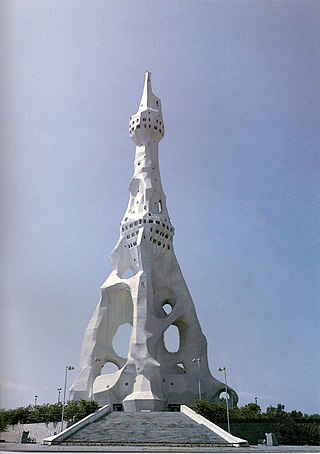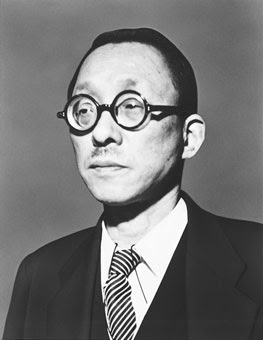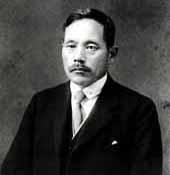Related Research Articles
In political science, Duverger's law holds that in political systems with only one winner, two main parties tend to emerge with minor parties typically splitting votes away from the most similar major party. In contrast, systems with proportional representation usually have more representation of minor parties in government.

Komeito, formerly New Komeito and abbreviated NKP, is a political party in Japan founded by members of the Buddhist movement Soka Gakkai in 1964. It is generally considered as centrist and conservative. Since 2012, it has served in government as the junior coalition partner of the nationalist and conservative governments led by the Liberal Democratic Party.

Soka Gakkai is a Japanese Buddhist religious movement based on the teachings of the 13th-century Japanese priest Nichiren. It claims the largest membership among Nichiren Buddhist groups.

Daisaku Ikeda was a Japanese Buddhist philosopher, educator, author, and nuclear disarmament advocate. He served as the third president and then honorary president of the Soka Gakkai, the largest of Japan's new religious movements. Ikeda was the founding president of the Soka Gakkai International (SGI), the world's largest Buddhist lay organization, which claims a membership of 12 million practitioners in 192 countries and territories, more than 1.5 million of whom reside outside of Japan as of 2012.
The Kōmeitō, also known as the Kōmei Party and Clean Government Party (CGP), was a political party in Japan, initiated by Daisaku Ikeda, and described by various authors as the "political arm" of Soka Gakkai.

Japanese new religions are new religious movements established in Japan. In Japanese, they are called shinshūkyō (新宗教) or shinkō shūkyō (新興宗教). Japanese scholars classify all religious organizations founded since the middle of the 19th century as "new religions"; thus, the term refers to a great diversity and number of organizations. Most came into being in the mid-to-late twentieth century and are influenced by much older traditional religions including Buddhism and Shinto. Foreign influences include Christianity, the Bible, and the writings of Nostradamus.

Jōsei Toda was a teacher, peace activist and second president of Soka Gakkai from 1951 to 1958. Imprisoned for two years during World War II under violating the Peace Preservation Law and the charge of lèse-majesté from against the war, he emerged from prison intent on rebuilding the Soka Gakkai. He has been described as the architect of the Soka Gakkai, the person chiefly responsible for its existence today.

Tsunesaburō Makiguchi was a Japanese educator who founded and became the first president of the Sōka Kyōiku Gakkai, the predecessor of today's Soka Gakkai.

General elections were held in Japan on 18 July 1993 to elect the 511 members of the House of Representatives. The Liberal Democratic Party (LDP), which had been in power since 1955, lost their majority in the House. An eight-party coalition government was formed and headed by Morihiro Hosokawa, the leader of the Japan New Party (JNP). The election result was profoundly important to Japan's domestic and foreign affairs.

General elections were held in Japan on 5 December 1976. Voter turnout was 73.45%. This election was noted for seeing 124 newcomers win seats for the first time, along with the defeat of some legacy candidates, signalling a generational shift in the Japanese political landscape. To date, the 1976 election has been the only post-war general election triggered by an expiration of the term of the House of Representatives; all other post-war elections have been instigated by a dissolution of the House by the Cabinet.
Matthew Søberg Shugart is an American political scientist. He is a Distinguished Professor of political science at the University of California, Davis. He is also an Affiliated Professor at the University of Haifa. Shugart specializes in electoral systems, party systems, and the design of political institutions, primarily through empirical studies of political systems across large numbers of countries. Shugart is also an orchardist, and runs the Fruits and Votes blog on electoral systems and fruit growing.

Akihiro Ota is a Japanese politician of the Komeito Party, currently serving his seventh term in the House of Representatives in the National Diet. Ota has represented three districts within the Tokyo metropolis since first entering the national Diet in 1993. He served as president of the Komeito Party from 2006 until the general election in September 2009, at which time he lost his seat in the Diet. Upon his return to the House in December 2012, Ota was appointed as the Minister of Land, Infrastructure, Transport and Tourism, a post he held until October 2015.

Hajime Ishii was a Japanese politician who served in the Diet for 39 years between 1969 and 2013. A native of Kobe, Hyogo, he attended Konan University as an undergraduate and University of California, Los Angeles as a graduate and received a master's degree in political science from Stanford University. During his time in the Diet he served as the head of the National Land Agency for six months in 1989–1990 and as Minister for Home Affairs for two months in 1994.
Shakubuku "break and subdue" (折伏) is a term that originates in the Chinese version of the Buddhist text, Śrīmālādevī Siṃhanāda Sūtra.

Yoshikatsu Takeiri was a Japanese politician who served as the third chair of Komeito from 1967 to 1986, making him the longest serving leader in the party's history.

Kōji Harashima was a Japanese politician and religious leader who briefly served as the first leader of Komeito, in addition to a serving as a board chairman for Soka Gakkai. He served in several other capacities throughout his career as well.

Takehisa Tsuji was a Japanese politician, religious leader, and elementary school teacher who served as the second leader of Komeito between 1964 and 1967.

Kōshirō Ishida was a Japanese politician who served as the fifth chairman of Komeito from 1989 to 1994, and also served as the leader of the New Komei breakaway party for its brief history.
Jun'ya Yano is a retired Japanese politician and political commentator who served as the fourth leader of Komeito between 1986 and 1989. Over a decade after leaving politics, Yano has become a notable critic of the party and its religious partner Soka Gakkai.
Komei Shimbun is a Japanese language daily newspaper which is the official organ of Komeito, a conservative political party in Japan. The paper has been in circulation since 1962.
References
- ↑ Klein, Axel (2005). "Review, Japanese Electoral Politics". Social Science Japan Journal. 8 (1): 157–160. doi:10.1093/ssjj/jyi007. JSTOR 193914.
- ↑ Christensen, Ray (2004). "Review, Japanese Electoral Politics". Journal of Japanese Studies. 30 (2): 569–572. doi:10.1353/jjs.2004.0051. JSTOR 193914. S2CID 144852970.
- ↑ Reed, Steven R. (1990). "Structure and Behaviour: Extending Duverger's Law to the Japanese Case". British Journal of Political Science. 20 (3): 335–356. doi:10.1017/S0007123400005871. JSTOR 193914. S2CID 154377379.
- ↑ Reed, Steven R. (2010). "Duverger's Law is Working in Italy". Comparative Political Studies. 34 (3): 312–327. doi:10.1177/0010414001034003004. S2CID 154808991.
- ↑ Browne, Eric; Patterson, Dennis (1999). "An Empirical Theory of Rational Nominating Behaviour Applied to Japanese District Elections". British Journal of Political Science. 29 (2): 259–289. doi:10.1017/s0007123499000125. JSTOR 194202. S2CID 153676752.
- ↑ Cox, Gary W. (1999). "A Comment on Browne and Patterson's 'An Empirical Theory of Rational Nominating Behaviour Applied to Japanese District Elections'". British Journal of Political Science. 29 (3): 565–569. doi:10.1017/s0007123499210265. JSTOR 194151. S2CID 250352154.
- ↑ Reed, Steven R. (2000). "What is Rational and Why Should We Care? A Comment on Browne and Patterson". British Journal of Political Science. 30 (3): 538–540. doi:10.1017/s000712340022022x. JSTOR 194008.
- ↑ Kohno, Masaru (1994). "Review, Making Common Sense of Japan". Pacific Affairs. 67: 123–124. doi:10.2307/2760138. JSTOR 2760138. S2CID 144287256.
- ↑ Huffman, James (1995). "Review, Making Common Sense of Japan". Journal of Japanese Studies. 21: 211–214. doi:10.2307/133107. JSTOR 133107.
- ↑ Hardacre, Helen (2016). "Review, Kōmeitō: Politics and Religion in Japan". Monumenta Nipponica. 71 (1). doi:10.1353/mni.2016.0032. S2CID 163943762.
- ↑ Mizuho Aoki (November 20, 2014). "Komeito's 50 years of losing its religion". The Japan Times. Retrieved April 4, 2017.
- ↑ Klein, Axel (2005). "Review, Japanese Electoral Politics". Social Science Japan Journal. 8 (1): 157–160. doi:10.1093/ssjj/jyi007. JSTOR 193914.